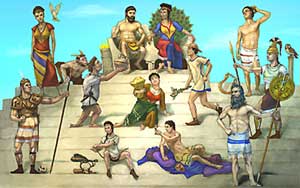The 12 Titans that ruled before the Olympians took over were, included the following ancient figures: Cronus At one point, Cronus (or Kronus) was the leader and youngest of the first generation of Titans. The 12 Olympians achieved their supremacy over the older primeval gods when they were victorious in the Battle of the Titans. According to mythology and the legend in the Greek Creation Myth the gods and goddesses of ancient Greece consisted of three major groups and generations. The 12 Olympians were the major gods and goddesses with prominent roles in Greek mythology. Although being an Olympian meant a throne on Mt. Olympus, some of the major Olympians spent most of their time elsewhere. Poseidon lived in the sea and Hades in the Underworld.
Two of the men, Prometheus and Epimetheus actually joined the Olympians against their fellow Titans. The rest of the Titan men chose Atlas to lead the battle against the Olympians. For ten years, the Titans and the Olympians fought with neither side able to gain a lasting advantage. Gaia advised Zeus to free the Cyclopes and the hundred headed.
The Titans, often called the Elder Gods, were for untold ages supreme in the universe. They were of enormous size and of incredible strength. The most important titan of all was Cronus, in Latin Saturn. He ruled over the other Titans until his son Zeus dethroned him and seized the power for himself. The Romans believed that when Zeus ascended the throne, Cronus fled to Italy and brought it in its Golden Age. Another notable Titan is Ocean, the river that is said to encircle the world; his wife Tethys; Hyperion, the father of the sun, the moon and the dawn; Mnemosyne, which means memory; Themis, usually translated by justice; And Iapetus, important because of his sons, Atlas, who bore the world on his shoulders, and Prometheus, who was the savior of mankind. The great Olympians were supreme among those who succeeded to the Titans. They were called Olympians because Olympus were their home. Olympus was first said to be on a mountain top, and generally identified with Greece's highest point, Mt. Olympus. In one passage of the Iliad, Zeus talks to the gods from the 'highest peak of many ridged Olympus' clearly a mountain. But a little further he says that if he willed he could hang earth and sea from a pinnacle of Olympus, clearly no longer a mountain. Even so, it is not heaven. Homer, said to be the author of the ancient poems Iliad and Odyssey, makes Poseidon say that he rules over the sea, Hades the dead, Zeus the heavens, but Olympus is common to all three. Wherever it was, the entrance to it was a great gate of clouds kept by seasons. No wind, Homer says, ever shakes the untroubled peace of Olympus; No rain ever falls there or snow; but the cloudless firmament stretches around it on all sides and the white glory of sunshine is diffused upon its walls.Titans (lords, rulers) In Greek mythology, primeval gigantic beings; children of Uranus and Gaea. Their number varies, though 12 are generally named, coinciding with the 12 Olympian gods who replaced the Titans as rulers. They are Oceanus, Tethys, Hyperion, Thia, Crius, Mnemosyne (Eurybia), Coeus, Phoebe, Cronus, Rhea, Iapetus, and Themis. Added to the list sometimes are Briareus, Cottus, Gyges, Enceladus, Porphyrion, and Rhoetus, though some accounts say they were just giants, not Titans.

Also called Titans are Prometheus, Epimetheus, and Atlas. Cronus, their leader, overthrew his father, Uranus, and castrated him. Cronus, in turn, was overthrown by his son Zeus. In the ensuing war Iapetus and all the 12 Titans, except Oceanus, sided with their brother Cronus against Zeus. The war continued for 10 years until Zeus, advised by Gaea, released from Tartarus, the lowest section of the underworld, the Cyclopes and the Hecatonchires, who sided with Zeus and helped him defeat the Titans, who were then cast into Tartarus.
12 Olympian Gods+2
Prometheus also sided with Zeus in the battle and was rewarded. The Titans appear in Hesiod’s Theogony, Hyginus’s Fables, and Apollodorus’s Biblioteca (Library). Keats’s unfinished epic, The Fall of Hyperion, deals with the sun god of the Titans. Mahler’s Symphony No. 1 in D is subtitled “Titan.”
Source:
Encyclopedia of World Mythology and Legend, Third Edition – Written by Anthony S. Mercatante & James R. Dow– Copyright © 2009 by Anthony S. Mercatante
Titan
Origin:
Wintv registration codefasrresume. Greece
The Titans are a pantheon of Greek spirits who preceded the Olympian spirits. They are the good-looking children of Gaia and Uranus, who refused to be ruled by the Olympians and so war ensued. The war between the Titans and the Olympians is called the Titanomachie. The war, waged in Thessaly, lasted for ten years. The Olympians finally won when Gaia promised Zeus victory if he would free the Cyclopes and Hecatoncheires from their captivity in the abyssal pit of Tartarus. (They are the less attractive children of Gaia and Uranus. Uranus was appalled by their looks and locked them away in Tartarus.) After their defeat, most of the Titans were either locked up in Tartarus or sent into exile to an island far away. Either way the Hecatoncheires have been charged to guardthem. The Titanesses, the Lady Titans, were generally spared.
The fate of the Titans, cast down into the depths, should have given pause to whoever named the great ship Titanic. The Titans are also memorialized in the name given to titanium, a metallic element of exceptional strength used in the production of steel.
Sacred site:
Mount Othrys is to the Titans as Mount Olympus is to the Olympians.
See Also:
Titans Vs Olympian Gods
Atlas; Gaia; Hekate; Oceanus; Prometheus; Styx; Zeus
Source:

Encyclopedia of Spirits: The Ultimate Guide to the Magic of Fairies, Genies, Demons, Ghosts, Gods & Goddesses – Written by Judika Illes Copyright © 2009 by Judika Illes.
12 Olympians And Some Titans Marcus Mariota
Back to Greek Mythology